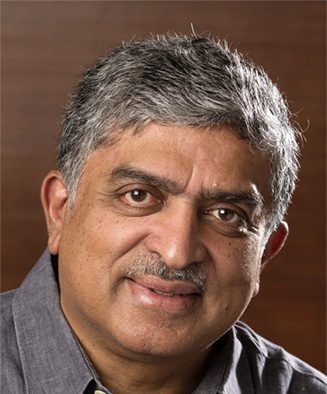On September 28, 2019 late night Nandan Nilekani co-founder of Infosys and currently its Non-Executive Chairman tweeted a congratulatory message: Proud of the Infosys family for being ranked the 3rd most respected company in the world.
For sure Nilekani and Infosys would be on anyone’s list of Global icons. Co-founder of Infosys, he worked on Aadhaar which is now a universal ID across India and co-author of Rebooting India and Imagining India, Nilenkani even dabbled in politics for a while, a role in which he would have done much good for Bangalore had he persisted.

This week Infosys, a global leader in next-generation digital service and consulting has been awarded the Number 3 ranking on the Forbes list of The World’s Best Regarded Companies for 2019. Ranked 31st in 2018, Infosys, under Nilekani has risen in the rankings exemplifying its strong performance.
Forbes’ list of The World’s Best Regarded
Companies includes the top 250 companies from Forbes’ Global 2000 list, which
tracks the world’s largest public companies. The list of the best regarded
companies is based on each company’s trustworthiness, honesty, social conduct,
fairness to its employees and the performance of its products and services.
The editors at Forbes said, “Forbes’ rankings
include companies spanning across geographies. This year’s list has a global
scope, reflecting the emerging prevalence of Asian companies in the United
States. Infosys has made great strides in the U.S. this year, after surpassing
its’ goal of hiring over 10,000 American employees.”
Nilekani was born in Bangalore, at Vani Vilas Hospital and studied at Bishop Cottons Boys School before moving to Dharward. He went to IIT Bombay at the age of 18. He credits his stint at IIT Mumbai for his skills at managing the corporate world. “When I look back at my IIT friends, the guys who are the most successful are not necessarily the guys with the highest grades. They were the guys who had built all round skills and they knew how to navigate. So, I think navigation skills is what I learnt,” Nilekani told Accel India Insights.
His interview by Narayan Murthy for his first
job led to a friendship where they along with five others formed Infosys in
1981. But it was in the 1990s that they began to scale up. To beat the
competition who were taking away talent from India, Infosys started thinking big,
to becoming a company where people would be willing to stay.
“We had to think big, we
had to think brand, we had to think infrastructure, we had to think scale and
that required us to change the way we operated. So, we had to professionalize
ourselves. So, we went from a company being run by a bunch of founders to a
company that hired great talent. So, that shift from an entrepreneurial
organization to a company designed for scale and realizing that our roles had
to change, that was actually a huge thing. Part of that was future planning,
say what do we want to be 3 years from now? What do we want to be 5 years from
now? Setting audacious goals and using audacious goals to unlock the way we did
things. When we were 3 to 5 million dollar company, we talked about being a 100
M dollar company. When we were approaching 100 M dollar in revenue, we said
what does it mean to be a billion dollars in revenue. It took us 3 to 5 years
to go from 5 M to 100M.”
BIG
DATA

At his talk at FICCI in April this year, Nilekani said that once data becomes the basis for decision making, there will be a great change. “The aggregation of data and applying AI to it will lead to opening of possibilities. Big data can be used in the financial system to catch fraud. Tax evasion can be captured by applying AI to big data. You can apply data to language translation, weather forecasting. Many macro things become possible.” It is in the use of big data to improve people’s lives that Nilekani has made a great contribution.
“In the West people were rich before they became data rich, so the business models that emerged were around advertising and other things. In India because of the data empowerment architecture which is unique to India, we have a way now of individuals and businesses using their own data to get some benefit. This is what we call as data empowerment, where instead of data being used by corporations and countries it will be used by individuals and small businesses,” Nilenkani said in a Carnegie India podcast.
The World
Bank in a recent report talks about how the poor in India depend on wages received
from MNREGA (India’s rural employment guarantee program). The tediousness of
collecting this money, securing it in a bank account was an uphill task for
many. Makhtar Diop, World Bank Vice
President for Infrastructure says, “IDs are taken for granted by those who have them. But lack of
identification creates barriers for each individual affected and for the
countries they live in.”
A lack of
identity has significant implications for a range of development outcomes, says
the World Bank report, on delivering services to people or on them being able
to access services. “Without a secure and trusted way to prove their identity,
people will often find themselves unable to access critical healthcare and
social services, enroll in school, open a bank account, obtain a mobile phone,
get a job, vote in an election, or register a business in the formal
sector—along with other basic services, rights, and opportunities that would
empower them to improve their lives.”
Nilekani was the Chairman of the Government’s Unique Identification Authority of India (UIDAI). He says “With concerted effort we can close the global identification gap and ensure that digital ID systems empower people, unlock new opportunities for all, and become transformative platforms for inclusive and sustainable development.”
In India because of the data empowerment architecture which is unique to India, we have a way now of individuals and businesses using their own data to get some benefit. This is what we call as data empowerment, where instead of data being used by corporations and countries it will be used by individuals and small businesses
Nandan Nilekani, Infosys
Talking about the interface of technology and society, Nilekani says that we are already moving away from the concept of one internet for the world. “The Chinese have created their own firewall and made their own internet. The Russians are doing that. Europeans are also doing that. Now it is the age of the Splinternet, where because of the impact of technology, countries will want to bring these technologies within their domain – on security, on privacy, on anti-trust, on fake news.”
He says just as globalisation is affecting the physical world, it is also playing out in a similar way digitally. Nilekani talks about the New Age Platform identifiers like Uber, Ola, Amazon and Flipkart changing the world both in terms of service as well as in job creation. Whether it is Amazon and Flipkart going retail, or the mobile providers facilitating movement like Ola and Uber, or food providers Swiggy, Zomata etc, all of them are creating jobs and combined with manufacturing, Nilekani says India should have many more job opportunities.





